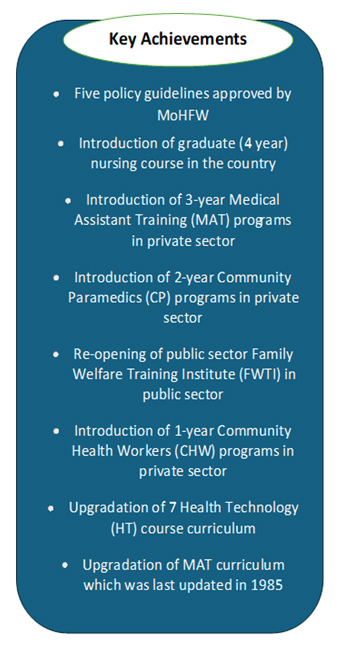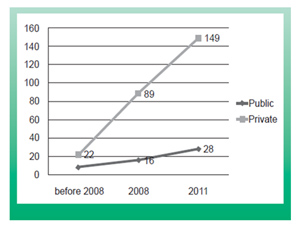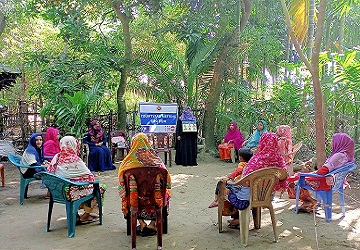Private Sector
RTMI is one of the pioneers among national NGOs to start working in the ‘for-profit’ private sector front. The journey started in early 2005 with the addressing of the skilled health workforce gap through a partnership with Katalyst project, jointly funded by CIDA, FCDO and SIDA. The work gained enough recognition that an outcome of one of the interventions was nominated as Bangladesh Case at the Second Global Forum for Human Resource for Health. Since the journey, RTMI has engaged with private sector and provided necessary support in making them a responsible service provider from just a profit-making concern.
Engaging private sector in local level planning and resource mobilization
RTMI is a consortium partner for the recently initiated USAID Bhitti activity(2024-2029), led by RTI, which aims to build the govt capacity in district and upazila local level planning based on findings from the epidemiological, equity gap and health system gap assessments. A key mandate of RTMI in this project is to facilitate private sector in the local level planning process and mobilize private resource to support implementation of the local level plan. As quality of health services in most of the private clinics in the district and upazila is not up to standards, RTMI will support the local level health managers in exploring ways to bring these under the purview of the Government monitoring and compliance.
Explore and link private sector for ensuring equitable service delivery in urban setting
USAID’s Urban Health activity (2024-2029) has been recently awarded to JSI and RTMI is one of the consortium partners. A key deliverable of RTMI is to support the cities and municipalities to design customized Healthy City Package which encompasses, beyond health, all aspects including sanitation, environment to ensure Healthy City. RTMI is also responsible for mapping and exploring service coverage and referral through different stakeholders including private sector. As part of this, RTMI will also be leading the review of existing or tested social protection schemes in the industry sectors, especially garments, and possible integration into the project.
Strengthening Healthcare Market
Skilled health workforce shortage came out as a crucial challenge in the market assessment studies that RTMI undertook. With the growing number of private clinics and diagnostic centers, increased demand for qualified and skilled human resources came as an emergency need. RTMI closely worked with Ministry of Health and Family Welfare and its directorates, Bangladesh Nursing Council and State Medical Faculty in formulating clear policy guidelines for introducing nursing and other medical para-professional courses and upgrading curricula to meet the current demands of the healthcare market. In addition, new certification courses viz. Community Paramedics and Community Health Worker courses have been introduced to meet the diversified needs of the population and thereby also creating employment opportunities for the rural youth population. In 2011, RTMI along with Swisscontact implemented a project to develop more Community Paramedics.
| To address the healthcare need of the population, project ASTHA project alone has supported creating 1,350 community paramedics during its first and second phase covering 2011-2023.” |
Engaging private universities and private training institutes
 Around 2000, the country started witnessing emerging of private universities. But nursing courses were not offered in these universities. Also, there were a number of LMA course institutes and some small training bodies offering health technology courses. RTMI motivated potential training institutes, and universities to offer the courses and simultaneously worked with the Ministry in easing the policy to facilitate entry of private sector to the health training market.
Around 2000, the country started witnessing emerging of private universities. But nursing courses were not offered in these universities. Also, there were a number of LMA course institutes and some small training bodies offering health technology courses. RTMI motivated potential training institutes, and universities to offer the courses and simultaneously worked with the Ministry in easing the policy to facilitate entry of private sector to the health training market.RTMI was able to conduct the advocacy programs as it has developed working relationship with the Ministry of Health and Family Welfare, Nursing Council of Bangladesh, Technical Education Board, Nursing Training Institute, Paramedics Training Institutes, Hospitals, Mass Media, Private Medical Institutions, Private Universities and Medical Colleges. Workshops, seminars, and round tables were organized for sensitizing, boosting, and disseminating information to the key stakeholders.
 The poor image of nursing profession is believed to affect the entrance of meritorious students to nursing education. To attract new students to this profession, RTMI undertook programs in partnership with private universities, private medical colleges, hospitals/clinics, media, NGOs and build positive awareness in the country through career campaigning and conducting programs on the important days such as International Nurses Day.
The poor image of nursing profession is believed to affect the entrance of meritorious students to nursing education. To attract new students to this profession, RTMI undertook programs in partnership with private universities, private medical colleges, hospitals/clinics, media, NGOs and build positive awareness in the country through career campaigning and conducting programs on the important days such as International Nurses Day. Piloting models engaging private industry stakeholders
Healthcare access for industry workers has remained a concern. RTMI implemented a pilot linking Brothers Furniture Ltd. with a healthcare provider, Shimantik to provide services for their workers. Against a group premium of Tk.3000 per month, Shimantik provided on-factory consultancy services, discounts on medicines and lab examinations for 200 laborers of Brothers Furniture Ltd. A year-end evaluation of the arrangement done in 2009 emphasized the importance of such models in ensuring healthcare for industry workers, as they don’t have access to regular govt/NGO services due to their long working hours in the factory.
Supporting Ready Made Garment Sector
The Readymade garment industry, the largest exporter of Bangladesh and an industry employing women in large, is subject to stringent national and international compliance. So, keeping up with the standards in all aspects is a prerequisite. RTMI has been supporting the industry meet these standards, through building capacity of medical team in the factories and establishing systems and practices for improved working conditions in the factories.
With funding support of Auchan Foundation, provide training to 100 nurses and 100 workers of selected readymade garment factories on emergency health care management, Sexual Reproductive Health Rights (SRHR) issues including child health and basic diagnostic procedures. On being commissioned by BSR, RTMI provided ToT to trainers of Kumudini Women’s Medical College and Hospital to systemically bridge the gap in quality of health services provided to workers in Ready-Made-Garment (RMG) industry. An M&E tool was introduced to regularly monitor the quality of services provided and thus work on improvements.
During 2013-16, RTMI was selected by ALDI South(largest retailer in Germany), to provide intensive capacity building in the factories towards a long term and sustainable improvement. Through this training managers and workers learn methods of working together towards problem solving without going into any conflict. By providing on-site training at the factories, cross-factory exchange of learning and embedding factories to apply the methods independently, an action learning modality was put to practice. ALDI engaged The German Consultancy Sustainability Agent (SUSA) to build the capacity of Bangladesh trainers. In addition, RTMI has also signed a contract with SUSA to conduct two IMCI training courses for the working nurses of the factories.
-
Current Information
-
Activities Pictures
RTM International are implementing Health Support and research activities in the different Districts of Bangladesh which are funded by different Donors.
RTMI-UNFPA Project

Courtyard meeting organized by RTMI-UNFPA
